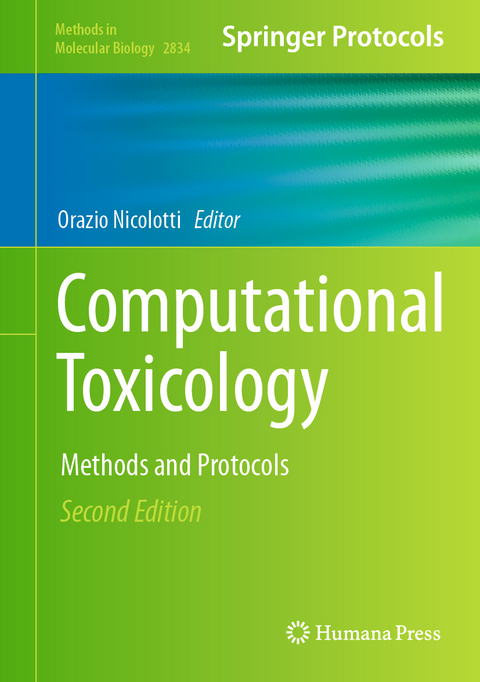
Computational Toxicology
Springer-Verlag New York Inc.
978-1-0716-4002-9 (ISBN)
Authoritative and cutting-edge, Computational Toxicology: Methods and Protocols, Second Editon aims to ensure successful results in the further study of this vital field.
QSAR: Using the Past to Study the Present.- Molecular similarity in predictive toxicology with a focus on the q-RASAR technique.- Weight of Evidence: criteria and applications.- Integration of QSAR and NAM in the Read Across process for an effective and relevant toxicological assessment.- Automated workflows for data curation and machine learning to develop Quantitative Structure-Activity Relationships.- Applicability Domain for Trustable Predictions.- The potential of molecular docking for predictive toxicology.- Computational toxicology methods in chemical library design and high-throughput screening hit validation.- Toxicity potential of nutraceuticals.- Development, use and validation of (Q)SARs for predicting genotoxicity and carcinogenicity: experiences from Italian National Institute of Health activities .- Adverse outcome pathways mechanistically describing hepatotoxicity.- Machine learning in early prediction of metabolism of drugs.- In vitro cell-based MTT and Crystal Violet assays for drug toxicity screening.- Recent advances in nanodrug delivery systems production, efficacy, safety and toxicity.- Investigating the benefit-risk profile of drugs: from spontaneous reporting systems to real word data for pharmacovigilance.- MolPredictX – a Pioneer Mobile App Version for Online Biological Activity Predictions by Machine Learning Models.- TIRESIA and TISBE, explainable artificial intelligence based web platforms for the transparent assessment of the developmental toxicity of chemicals and drugs.- PFAS-Biomolecule Interactions: Case Study Using Asclepios Nodes and automated Workflows in KNIME for Drug Discovery and Toxicology.
| Erscheinungsdatum | 25.09.2024 |
|---|---|
| Reihe/Serie | Methods in Molecular Biology |
| Zusatzinfo | 3 Illustrations, black and white; XIV, 445 p. 3 illus. |
| Verlagsort | New York, NY |
| Sprache | englisch |
| Maße | 178 x 254 mm |
| Themenwelt | Mathematik / Informatik ► Informatik ► Theorie / Studium |
| Informatik ► Weitere Themen ► Bioinformatik | |
| Studium ► 2. Studienabschnitt (Klinik) ► Pharmakologie / Toxikologie | |
| Naturwissenschaften ► Biologie | |
| Schlagworte | Data Modeling • drug discovery • Predictive toxicology • Target-specific models • web applications |
| ISBN-10 | 1-0716-4002-X / 107164002X |
| ISBN-13 | 978-1-0716-4002-9 / 9781071640029 |
| Zustand | Neuware |
| Informationen gemäß Produktsicherheitsverordnung (GPSR) | |
| Haben Sie eine Frage zum Produkt? |
aus dem Bereich


